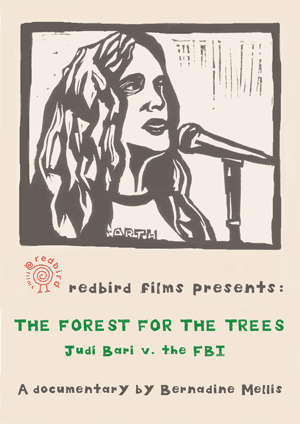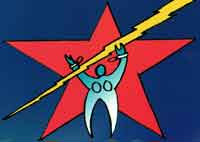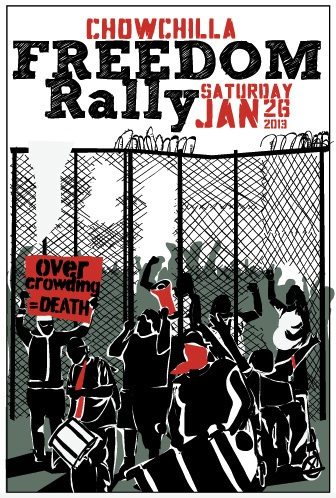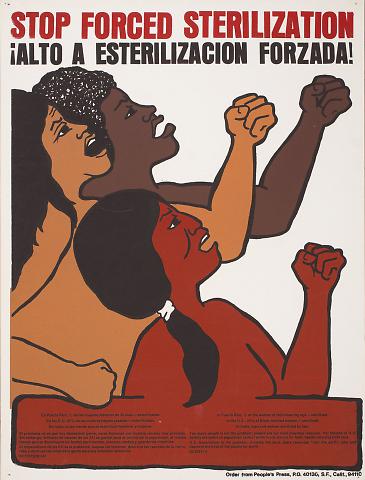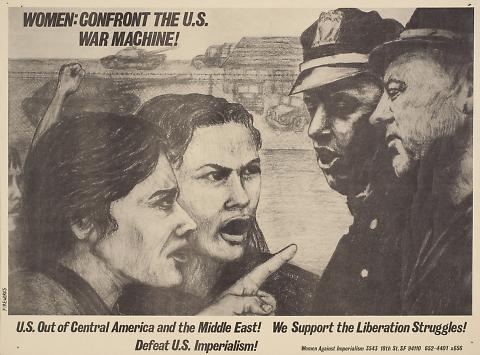Gender and Sexuality
This collection features materials from a number of sources focusing on struggles revolving around gender and sexuality. These struggles are not separate from larger struggles for liberation but specifically incorporate unique voices and perspectives.
Subcollections
-
Connexions
Connexions is the collective product of feminists of diverse nationalities and political perspectives committed to contributing to an international women\'s movement. -
Feminist and Lesbian Politics: Monographs-Periodicals-Articles
This collection contains materials focusing on radical feminist and lesbian politics. While diverse in medium and subject matter, this collection contextualizes women’s liberation highlighting issues of class, race, sexuality and imperialism. -
Materials shot and collected in the making of The Forest for the Trees
Raw materials from the documentary "The Forest for the Trees" which details the amazing story of the fight to clear Earth First! activist Judi Bari's name after her car was bombed and she was arrested as a terrorist. -
Out of Control: Lesbian Committee to Support Women Prisoners
Out of Control (OOC) was a self-supporting committee formed in 1987 to organize resistance to the Lexington Control Unit for women. -
Prisons - Women
This collection contains materials relating to the specific conditions, challenges and struggles facing women in prison. Topics are varied but materials include conference papers, informational materials, legal perspectives and audio recordings. -
Programs produced by Judy Gerber and Laurie Simms
This collection contains grassroots radio programming produced by Judy Gerber and Laurie Simms. This programming primarily occurred during the 1980s and 1990s. -
Sterilization
This collection contains materials focusing on the sterilization of women and efforts to resist this practice. -
Violence Against Women
This collection contains materials focusing on violence against women. Specific topics covered include women who fight back against their abusers, rape, pornography, sexism and self-defense. -
Women Against Imperialism
Women Against Imperialism was a grassroots, feminist, anti-imperialist solidarity organization formed in San Francisco in 1981. Women Against Imperialism’s work primarily consisted of direct action organizing and political education activities.
Documents
Date: 12/26/1995Call Number: PM 133Format: 1/4 7 1/2 ipsProducers: KPFAProgram: Freedom is a Constant Struggle (Freedom Is A Constant Struggle)Collection: Prisons - Women
Interview with Marilyn Buck, Dylcia Pagan, Ida Robinson, and Linda Evans, by Kiilu Nyasha, at the National Federal Prison of Dublin, California. Discussion about life in prison, being a political prisoner, being a mother in prison, current prison conditions, racism, white supremacy, anti-imperialism, and U. S. foreign and economic policy. Worker’s rights are discussed and how they affect prisoners who work for multi international corporations. Puerto Rico and its struggle to gain independence is discussed by Dylcia Pagan at length. The loss of the extended family for support of prisoners and their children is also spoken about at length.
Date: 12/26/1995Call Number: PM 134Format: 1/4 7 1/2 ipsProducers: KPFAProgram: Freedom is a Constant Struggle (Freedom Is A Constant Struggle)Collection: Prisons - Women
Interview with Marilyn Buck, Dylcia Pagan, Ida Robinson, and Linda Evans, by Kiilu Nyasha, at the National Federal Prison of Dublin, California. Discussion about life in prison, being a political prisoner, being a mother in prison, current prison conditions, racism, white supremacy, anti-imperialism, and U. S. foreign and economic policy. Worker’s rights are discussed and how they affect prisoners who work for multi international corporations. Puerto Rico and its struggle to gain independence is discussed by Dylcia Pagan at length. The loss of the extended family for support of prisoners and their children is also spoken about at length.
Intervew of Women in Prison, Dublin, CA 1995. Political prisoners Dylcia Pagan, Linda Evans, Ida Robinson, and Marilyn Buck are asked to speak about themselves and why they are in prison.
The women also discuss the GATT (General Agreement on Trade and Tariffs), NAFTA (North American Free Trade Agreement), the lack of wages and benefits for the poor and oppressed, and the wrongs of the IMF (International Monetary Fund). Ida Robinson speaks about families of ethnic minorities, and Marilyn Buck speaks about how political prisoners aren’t violent, they are just casualties during the conflict. The women discuss the state of the poor white woman, how is marginalized because no one is fighting for her and she has no representation.
Call Number: JG/ 001Format: 1/4 7 1/2 ipsProducers: Judy GerberCollection: Programs produced by Judy Gerber and Laurie Simms
FSLN (Frente Sandinista Liberacion Nacional) speaker about revolutionary work after electoral defeat.
Call Number: JG/ 012Format: CassetteProducers: Judy GerberCollection: Programs produced by Judy Gerber and Laurie Simms
Tim Blunk, Susan Rosenberg, Marilyn Buck, Linda Evans, Laura Whitehorn, Alan Berkman on trial for capitol bombing in 1983, two military bases between 1983 and 1984.
Call Number: JG/ 061BFormat: Cass BProducers: Judy GerberCollection: Programs produced by Judy Gerber and Laurie Simms
Judy Gerber interviews political prisoners/prisoners of war housed at the Lexington Control Unit in Kentucky. Puerto Rican Independista Alejandrina Torres and North American anti-imperialists Sylvia Baraldini and Susan Rosenberg, all inmates in Lexington, discuss the psychological torture they have endured in this unit including the absence of natural sunlight, denial of personal property, limited contact with family and the outside world, pointless and humiliating strip searches and other sexual torture, and medical neglect. Also discussed is the importance of public pressure in the form of national and international campaigns against these horrendous conditions.
Call Number: JG/ 062Format: CassetteProducers: Judy GerberCollection: Programs produced by Judy Gerber and Laurie Simms
An interview with Laura Whitehorn and Linda Evans, two North American political prisoners currently serving long sentences at the Federal Prison in Pleasanton as a result of their political activities. Linda and Laura have been anti-imperialist activities for twenty years, most recently in the anti-Klan, Black solidarity and lesbian and women's movements. Part of a series on U.S. political prisoners, produced by Judy Gerber.
Note: Since the broadcast of this program, both Laura Whitehorn and Linda Evans have been freed.
Call Number: JG/ 063Format: 1/4 7 1/2 ipsProducers: Judy GerberCollection: Programs produced by Judy Gerber and Laurie Simms
SAME AS JG/LS 062:
An interview with Laura Whitehorn and Linda Evans, two North American political prisoners currently serving long sentences at the Federal Prison in Pleasanton as a result of their political activities. Linda and Laura have been anti-imperialist activities for twenty years, most recently in the anti-Klan, Black solidarity and lesbian and women's movements. Part of a series on U.S. political prisoners, produced by Judy Gerber.
Note: Since the broadcast of this program, both Laura Whitehorn and Linda Evans have been freed.
Call Number: JG/ 080AFormat: Cass AProducers: Judy GerberCollection: Programs produced by Judy Gerber and Laurie Simms
Recorded in October 1990, Blase Bonpane uses the example of Liberation Theology to illustrate the need for a separation of media and state, or media and power. Uses misrepresentation of Liberation Theology, exemplified by October 9, 1990 LA Times article, "The Cross and The Gun" by Kenneth Freed, as a framework in which to discuss media as advocates of the agenda for the affluent. Bonpane discusses liberation theology from the perspective of the poor, focusing on Central American cases, which sharply contrasts the representation of it in the article. Discussion of media acceptance of institutional violence and Imperial Theology, and its rejection of oppressed people's response to institutional violence and liberation theology. Defines Liberation Theology as based on human need, not advocating violence and in opposition to Imperial Theology which advocates the relationship between the cross and gun or cross and crown.
Call Number: JG/ 085AFormat: Cass AProducers: Judy GerberProgram: A Defiant HeartCollection: Programs produced by Judy Gerber and Laurie Simms
1993 Interview on current U.S. actions in Somalia with Walter Turner, Producer of Africa Press Review on KPFA, History Professor at UC Berkeley, President of Global Exchange. Turner illuminates the role of U.S. intervention in Somalia over the past several decades. He notes the Cold War implications of U.S. African policy, a "football," particularly noting the switch of U.S. alliance from Somalia to Ethiopia during the war between those nations in the late 1970's. He also describes the ethnic make-up of Somalia and how the colonial legacy of ethnic division fosters current power struggles. He raises doubts about the "humanitarian" nature of U.S. intervention in Somalia because it appears by all counts to be a military intervention. He sees U.S. policies as the root cause of the crisis, both in the provision of weapons and cruel international development policies. He calls for U.N. negotiations on Somalia.



